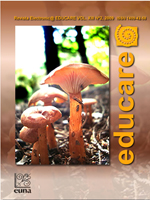El apoyo familiar en el proceso de integración educativa de estudiantes con necesidades educativas en condición de discapacidad
DOI:
https://doi.org/10.15359/ree.13-2.2Keywords:
family support, processes of students’ school integration and educational needsAbstract
In the process of socialization, the family has a fundamental role in the care and raising of the children, but principally, in the transmission of knowledge, values and customs that allow them to adapt to the society as active and productive individuals. In the last years, the Costa Rican educational system has experienced significant changes, due to the processes of students’ school integration, who present educational needs, because they need specialized supports and different resources for their formation and integral development. Thus, a concern was generated so that the familiar support is investigating in the process of students’ school integration, who are the ones who receive significant curricular adaptations in the public schools, and for instance, it was necessary to determine the kind of supports that are provided to the members of the family, as well as, the ways in which these supports can benefit the process of school integration.
References
Arés, P. (1997a). Psicología de la familia. Taller internacional de familia. La Habana, Cuba: Facultad
de Psicología, Universidad de la Habana.
Arés, P. (1997b). La familia una mirada al futuro. Taller internacional de familia. La Habana, Cuba:
Facultad de Psicología, Universidad de la Habana.
Barrantes, R. (1999). Investigación. Un camino al conocimiento. Un enfoque cualitativo y cuantitativo.
San José, Costa Rica: Editorial Universidad Estatal a Distancia.
Campabadal, M. (2001). El niño con discapacidad y su entorno. San José, Costa Rica: Editorial
Universidad Estatal a Distancia.
Costa Rica. Asamblea Legislativa. (1996). Ley 7600. Igualdad de Oportunidades para la Personas
con Discapacidad. San José, Costa Rica: Imprenta Nacional.
Costa Rica. Asamblea Legislativa. (2008). Ley 8661. Convención sobre los derechos de las Personas
con Discapacidad y su protocolo. San José, Costa Rica: Imprenta Nacional.
Costa Rica. Ministerio de Educación Pública. (2005a). Normas y procedimientos para el manejo
técnico administrativo de los servicios educativos para estudiantes con retardo mental. San
José, Costa Rica: Centro Nacional de Recursos para la Educación Inclusiva.
Costa Rica. Ministerio de Educación pública. (2005b). Políticas, Normativa y Procedimientos para
el acceso a la Educación de los Estudiantes con Necesidades Educativas Especiales. San
José, Costa Rica: Centro Nacional de Recursos para la Educación Inclusiva.
Flores, S. & Rodríguez, C. (2000). Características de la familia uniparental y las relaciones
sociales de los niños y las niñas entre 4 y 8 años. Miembros de estas familias y que asisten
a la guardería del Hospicio de Huérfanos de San José. Tesina para optar por el grado de
Bachillerato en Trabajo Social no publicada. San José, Universidad de Costa Rica.
Hernández Sampieri, R., Fernández Collado, C. & Baptista Lucio, P. (2003). Metodología de la
investigación. (3ª ed.). México: Editorial McGraw-Hill.
Heward, W. (1997). Niños excepcionales: una introducción a la Educación Especial. Madrid,
España: Prentice Hall.
Organización Panamericana de la Salud. (2004). La discapacidad en Costa Rica: situación actual
y perspectivas. San José, Costa Rica: Organización Panamericana de la Salud.
Sánchez Palomino, A. & Torres González, J. (2000). Educación Especial. Centros educativos y
profesorados ante la diversidad. Madrid, España: Ediciones Pirámide.
Downloads
Additional Files
Published
How to Cite
Issue
Section
License
1. In case the submitted paper is accepted for publication, the author(s) FREELY, COSTLESS, EXCLUSIVELY AND FOR AN INDEFINITE TERM transfer copyrights and patrimonial rights to Universidad Nacional (UNA, Costa Rica). For more details check the Originality Statement and Copyright Transfer Agreement
2. REUTILIZATION RIGHTS: UNA authorizes authors to use, for any purpose (among them selfarchiving or autoarchiving) and to publish in the Internet in any electronic site, the paper´'s final version, both approved and published (post print), as long as it is done with a non commercial purpose, does not generate derivates without previous consentment and recognizes both publisher's name and authorship.
3. The submission and possible publication of the paper in the Educare Electronic Journal is ruled by the Journal’s editorial policies, the institutional rules of Universidad Nacional and the laws of the Republic of Costa Rica. Additionally, any possible difference of opinion or future dispute shall be settled in accordance with the mechanisms of Alternative Dispute Resolution and the Costa Rican Jurisdiction.
4. In all cases, it is understood that the opinions issued are those of the authors and do not necessarily reflect the position and opinion of Educare, CIDE or Universidad Nacional, Costa Rica. It is also understood that, in the exercise of academic freedom, the authors have carried out a rogorous scientific-academic process of research, reflection and argumentation thar lays within the thematic scope of interest of the Journal.
5. The papers published by Educare Electronic Journal use a Creative Commons License:














 The articles published by Educare Electronic Journal can be shared with a Creative Commons License:
The articles published by Educare Electronic Journal can be shared with a Creative Commons License: 



